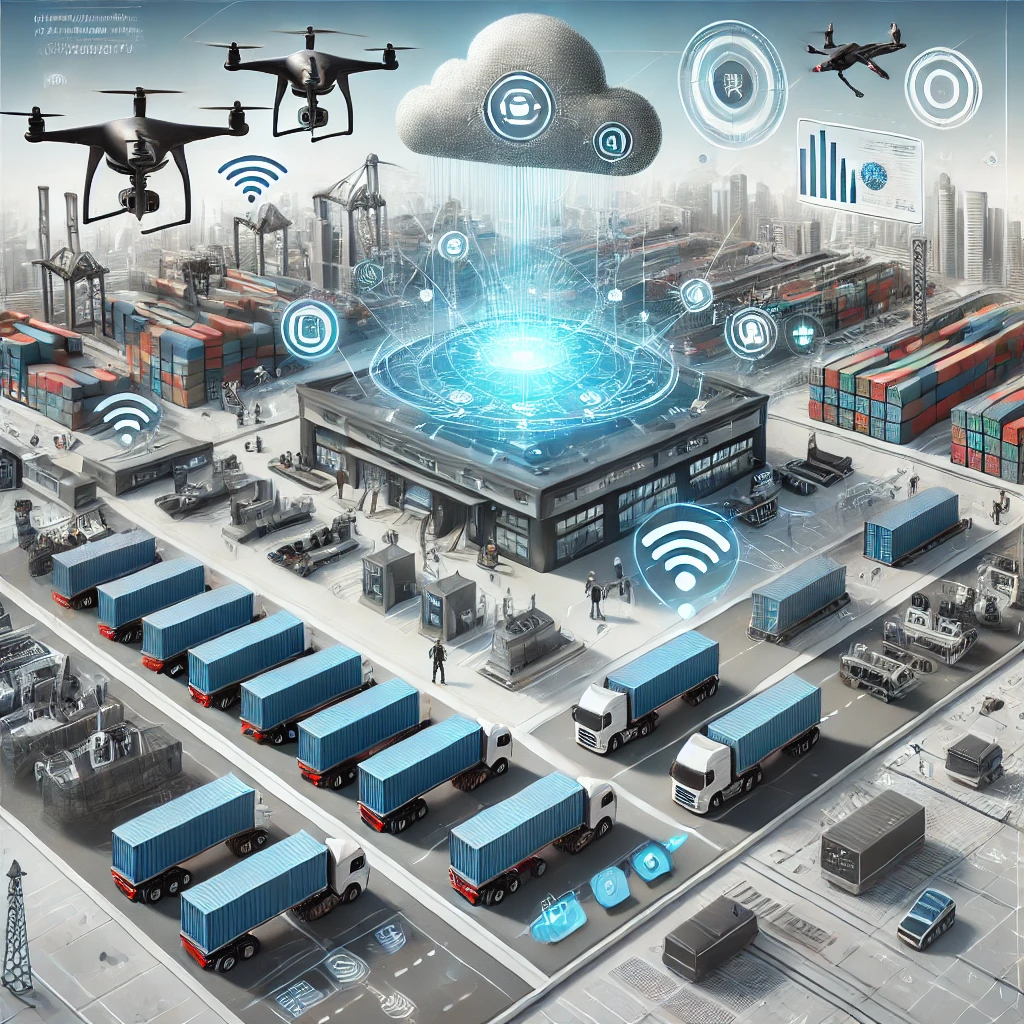Shipping Logistics Companies: Integrating Technology for Better Service

The Technological Transformation of Shipping Logistics
The integration of cutting-edge technologies is reshaping the shipping logistics industry, enabling companies to:
- Enhance operational efficiency
- Improve visibility and transparency
- Reduce costs and errors
- Increase customer satisfaction
- Adapt to market changes more quickly
Let’s delve into the key technologies driving this transformation and how Linbis is helping shipping logistics companies harness their power.
Key Technologies Revolutionizing Shipping Logistics
1. Internet of Things (IoT)
IoT devices are transforming how shipments are tracked and monitored:
- Real-time location tracking
- Environmental condition monitoring (temperature, humidity)
- Predictive maintenance for vehicles and equipment
Linbis Advantage: Our tracking container software seamlessly integrates with IoT devices, providing real-time data on shipment location and conditions.
2. Artificial Intelligence (AI) and Machine Learning (ML)
AI and ML are enhancing decision-making and predictive capabilities:
- Route optimization
- Demand forecasting
- Predictive analytics for potential disruptions
Linbis Solution: Our AI-powered analytics tools help shipping logistics companies make data-driven decisions and anticipate market changes.
3. Blockchain Technology
Blockchain is improving transparency and security in logistics:
- Secure and transparent documentation
- Smart contracts for automated processes
- Enhanced traceability of goods
Linbis Feature: Our platform incorporates blockchain technology for secure, tamper-proof documentation and tracking.
4. Cloud Computing
Cloud-based solutions are enabling better collaboration and data accessibility:
- Real-time data sharing across the supply chain
- Scalable storage and computing power
- Enhanced disaster recovery capabilities
Linbis Benefit: Our cloud-based logistics solutions offer seamless accessibility and scalability for shipping logistics companies of all sizes.
5. Big Data Analytics
Big data is providing unprecedented insights into logistics operations:
- Performance analytics
- Customer behavior analysis
- Supply chain optimization
Linbis Capability: Our advanced analytics tools help shipping logistics companies turn vast amounts of data into actionable insights.
6. Robotic Process Automation (RPA)
RPA is streamlining repetitive tasks and improving accuracy:
- Automated data entry and processing
- Inventory management
- Invoice processing and payment reconciliation
Linbis Integration: Our software integrates with RPA tools to automate routine tasks, reducing errors and freeing up human resources.
7. Autonomous Vehicles and Drones
Emerging technologies are reshaping last-mile delivery:
- Self-driving trucks for long-haul transport
- Autonomous robots for warehouse operations
- Drones for remote or urgent deliveries
Linbis Innovation: While not directly involved in autonomous vehicle development, our platform is designed to integrate with these emerging technologies as they become more prevalent.

Benefits of Technology Integration for Shipping Logistics Companies
- Enhanced Visibility: Real-time tracking and status updates across the entire supply chain.
- Improved Efficiency: Streamlined processes and reduced manual interventions.
- Cost Reduction: Optimized routes, reduced errors, and better resource allocation.
- Increased Accuracy: Minimized human errors through automation and data validation.
- Better Customer Service: Faster response times and more accurate information for customers.
- Agility and Flexibility: Quicker adaptation to market changes and disruptions.
- Sustainability: Reduced carbon footprint through optimized routes and better resource utilization.
How Linbis Facilitates Technology Integration
Linbis’s tracking container software and logistics solutions are designed to help shipping logistics companies seamlessly integrate advanced technologies into their operations:
- Unified Platform: Our software provides a single, comprehensive platform that integrates various technologies and data sources.
- API Integration: Easy integration with existing systems and emerging technologies through robust APIs.
- Scalable Architecture: Cloud-based infrastructure that grows with your business needs.
- Advanced Analytics: AI-powered insights to drive informed decision-making and continuous improvement.
- Mobile Accessibility: Access critical information and manage operations on-the-go with our mobile-friendly platform.
- Customization Options: Tailor our solutions to meet the specific needs of your shipping logistics company.
- Continuous Updates: Regular software updates to incorporate the latest technological advancements and industry best practices.

Case Study: Transforming a Shipping Logistics Company with Linbis
Company X, a mid-sized shipping logistics provider, was struggling to keep up with technological advancements in the industry. By implementing Linbis’s tracking container software and logistics solutions, they were able to:
- Improve shipment visibility by 60%
- Reduce operational costs by 25%
- Increase customer satisfaction scores by 35%
- Expand their service offerings to include real-time tracking and predictive ETAs
This case study demonstrates how Linbis’s technology can transform a shipping logistics company’s operations, leading to significant improvements in efficiency, cost-effectiveness, and customer satisfaction.

Best Practices for Technology Integration in Shipping Logistics
- Develop a Clear Technology Strategy: Align technology investments with business goals and customer needs.
- Focus on User Adoption: Provide comprehensive training and support to ensure successful implementation.
- Prioritize Data Security: Implement robust security measures to protect sensitive information.
- Embrace Cloud Solutions: Leverage cloud computing for scalability and accessibility.
- Foster a Culture of Innovation: Encourage continuous learning and experimentation with new technologies.
- Collaborate with Tech Partners: Work closely with technology providers like Linbis to stay at the forefront of innovation.
- Measure and Analyze Results: Continuously monitor the impact of technology integration and adjust strategies as needed.

The Future of Technology in Shipping Logistics
As technology continues to evolve, we can expect to see:
- Increased use of AI for autonomous decision-making
- Expansion of IoT networks for more comprehensive tracking and monitoring
- Integration of augmented reality (AR) in warehouse operations
- Greater emphasis on cybersecurity in logistics operations
- Adoption of 5G technology for faster and more reliable data transmission
Linbis is committed to staying at the forefront of these technological trends, continuously updating our solutions to help shipping logistics companies adapt and thrive in this rapidly changing landscape.
.
Conclusion: Embracing Technology for Logistics Excellence
The integration of advanced technologies is no longer optional for shipping logistics companies – it’s a necessity for survival and growth in today’s competitive marketplace. By leveraging technologies like IoT, AI, blockchain, and cloud computing, and partnering with innovative solution providers like Linbis, shipping logistics companies can dramatically improve their operations, enhance customer service, and position themselves for long-term success.
Remember, successful technology integration is an ongoing process that requires careful planning, execution, and continuous refinement. With Linbis as your technology partner, you can navigate this complex landscape with confidence, ensuring that your shipping logistics company remains at the cutting edge of industry innovation.
Ready to revolutionize your shipping logistics operations with advanced technology? Contact Linbis today for a personalized demo of our innovative logistics solutions. Let us show you how we can help you integrate cutting-edge technology to enhance your services, streamline your operations, and drive growth in the competitive world of shipping logistics.
By embracing technological integration and leveraging Linbis’s advanced solutions, you’re not just keeping pace with the industry – you’re positioning your shipping logistics company as a leader in the digital age of global commerce.
